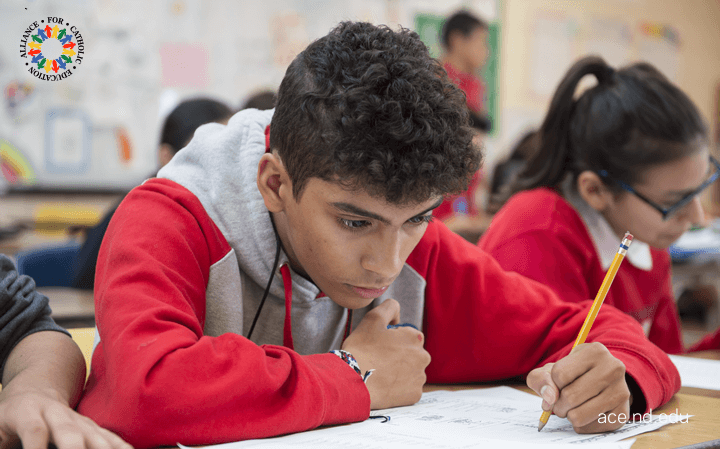Tricia Baumer understands the need for a good foundation. She spent her time teaching the building blocks of good writing and reading skills to the freshmen in her English class as a member of the sixth cohort of ACE Teaching Fellows at Bishop Kenny High School in Jacksonville, Florida. Even at the high school level, they started with the basics: the intricacies of the sentence, then the paragraph, and onward. For Tricia, it was imperative that her students accomplished each skill along the way. No one, even in the accelerated class, could move on until they had shown that they had mastered the foundational skills of writing. Students complained, of course, since not all of these important skills were especially fun or exciting, but Tricia knew the truth: some beginning rules are formulaic and almost mathematical in their nature, but good writing comes when students know how to use these rules effectively and when to break them to create the most impact on the reader.
 As a new teacher, Tricia realized how integral the building block of social justice was to her understanding of education. She immigrated to the United States from the Philippines with her family when she was in third grade and experienced different educational systems from her time in the Philippines and the United States, as well as time her family spent in Hong Kong. Tricia's experience led her to see how equity and diversity in the classroom provided the blueprint for living the principles of Catholic social justice in the larger educational world.
As a new teacher, Tricia realized how integral the building block of social justice was to her understanding of education. She immigrated to the United States from the Philippines with her family when she was in third grade and experienced different educational systems from her time in the Philippines and the United States, as well as time her family spent in Hong Kong. Tricia's experience led her to see how equity and diversity in the classroom provided the blueprint for living the principles of Catholic social justice in the larger educational world.
When Tricia became a principal, she wanted to learn how to help students and schools expand their abilities to provide a just and full education for every child, so she joined the Mary Ann Remick Leadership Program. She found that once again her desire to create a strong foundation served her well. With her action research project, Tricia discovered that she liked analyzing data–she enjoyed working with the building blocks of research, looking for ways to read the data, and creating plans for putting the outcomes in action. To put those skills to work, she entered the PhD program at Southern Methodist University.
During the program, Tricia's passion for social justice landed her in the Dallas Independent School District (ISD). As the Director of the Office of Transformation and Innovation, Tricia looked for ways to help all students learn in the best place and with the best methods for their needs. She and her team found that magnet schools for the performing arts, STEM disciplines, or the gifted and talented often required students to meet an academic prerequisite, provide an audition tape, take a test, or interview. Students who didn't have the means to meet these extra steps might miss an opportunity they deserved. Tricia knew that these students could thrive in these schools and deserved access to these programs, and if she could help students learn in the best place for their needs, then the Dallas ISD could engage even more students.
"Tricia's experience led her to see how equity and diversity in the classroom provided the blueprint for living the principles of Catholic social justice in the larger educational world."
So Tricia and her office created Transformation schools, open enrollment schools that strive to create "best-fit schools" where educators can better engage students by tapping into their specific interests, aspirations, and learning styles. These Transformation schools are organized around an anchoring concept, like a concentration on the STEM disciplines, a leadership model, or a Montessori model. One of their newest offerings is a school combining urban community development and architecture. Tricia envisions that the students will use the city as their classroom. In a studio class, students might engage in a project that would propose a structure that would go in an urban park in Dallas. Then in their math class, the students would use their skills to think about the dimensions of the structure. In art class, they would learn about which materials would be best to use for their structure, and in science class, how weather and climate would affect it. They would research city policy and might even pitch their proposal to the city council, taking advantage of an opportunity to make their structure become a reality. In this way, Tricia and her team hope that they can create active, involved citizens who are academically strong and knowledgeable about the world around them.
Creating diverse offerings for all kinds of students is what makes Tricia feel like she still is building the blocks of comprehensive and effective education for all students. This summer, Tricia will take this work to San Antonio, where she will join the San Antonio Independent School District as the Senior Director of the Office of Access and Enrollment. She will work with the Chief of Innovation to establish access and equity to policies that will benefit all families. Each day, Tricia will be able to use her foundational understanding of social justice to make sure that all students can reach their full academic potential no matter their interest, need, or ability.
 Alliance for Catholic Education
Alliance for Catholic Education
